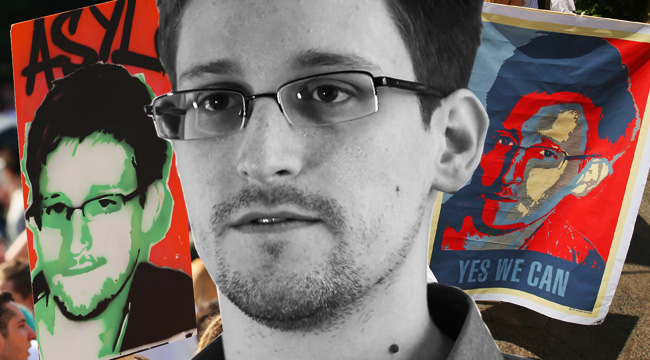
Fifteen staff members who worked on a well-known bipartisan intelligence watchdog committee wrote to President Barack Obama and Attorney General Loretta Lynch on Monday requesting the administration negotiate a plea agreement with former NSA contractor Edward Snowden.
“There is no question that Edward Snowden’s disclosures led to public awareness which stimulated reform,” wrote the staffers who served on the U.S. Senate Select Committee to Study Governmental Operation with Respect to Intelligence Activities — called the Church Committee, after its Chairman, Idaho Senator Frank Church.
“Whether or not these clear benefits to the country merit a pardon, they surely do counsel for leniency,” the authors continued.
Frederick, or “Fritz” Schwarz, Jr., the Church Committee’s Chief Counsel who now heads up policy and legal advocacy organization the Brennan Center for Justice, penned the letter alongside the committee’s staff director, William Green Miller, and thirteen other co-signers.
Schwarz, who published a book last year on the allure of government secrecy called Democracy in the Dark, says he has been captivated by Snowden since the former National Security Agency contractor first made his disclosures. “Ive known many whistleblowers starting when I was Chief Counsel of the Church Committee, and they’re often praise worthy…but [Snowden] seemed straightforward and genuine,” he said during a phone interview with The Intercept.
In the 1970s, the Church committee conducted an unprecedented investigation that uncovered abuses by the intelligence committee and led to reforms. Schwarz recalled, during a recorded interview with the Brennan Center’s Michael German, being involved in the first and “most comprehensive” investigation into the intelligence community, which was aimed at being “open and rigorous” — challenging senators who willfully turned a blind eye to the nation’s spies and their misdeeds.
The climate at the time, wracked with scandals like Watergate, and leaks, like the Pentagon Papers, “led to a pent up interest in what the secret government had been doing,” he said.
The committee uncovered the NSA’s practice of retaining copies of telegrams sent overseas, the CIA’s experimentation with hallucinogenic drugs and use of domestic surveillance, and the FBI’s widely discredited program under J. Edgar Hoover, called COINTELPRO, involving the monitoring of constitutionally protected activities.
Yet that climate of support for reform and investigation has changed, the authors argued. “The government has all but stopped making bipartisan reforms,” they wrote, arguing that this has left whistleblowers to take matters into their own hands.
Snowden, who provided a massive trove of documents about the government’s worldwide surveillance regime to journalists in 2013, served as the spark to inspire lawmakers to reach across the aisle and amend the Patriot Act, ending the bulk collection metadata program in the summer of 2015, they wrote. And, his revelations uncovered the extent of overseas spying, which the Church Committee staffers note led President Obama to promise stronger privacy protections for foreigners.
If Snowden hadn’t come forward, Americans might never have known about the abuses taking place, the authors argue. “We know first hand that lack of disclosure can cause just as many, if not more, harms to the nation than disclosure,” they wrote. “When intelligence agencies operate in the dark, they often have gone too far in trampling on the legitimate rights of law-abiding Americans and damaging our reputation internationally.”
They also noted that the government has been lenient towards senior national security officials who have been involved in divulging secrets, like former CIA director David Patraeus, who provided classified information to his biographer, with whom he was having an affair, and pled guilty to a simple misdemeanor.
Petraeus is now reportedly being considered for a role in President-elect Donald Trump’s administration.
“In all these cases, recognition of the public service the individuals had provided weighed against strict enforcement of the law, to come to a fair and just result,” the authors wrote.
Meanwhile, the harsh treatment of other whistleblowers, like Thomas Drake and Chelsea Manning, may have inspired Snowden to take the route he did, they suggest.
The authors directly challenged several assertions made by the House Intelligence Committee in a short unclassified excerpt of its investigation into Snowden’s motivations and actions, which concluded in September. The full contents of the House’s investigation remain classified, though the Committee has submitted it for declassification and publication.
Notably, the former Church Committee staffers did not advocate for a pardon, something President Obama has rejected as a possibility. Instead, they urged the government to consider offering Snowden a deal.
“Under current law, the only way to weigh the public benefits of Snowden’s leaks and account for his aim to help America is for the government to mitigate the charges through settlement discussions,” they concluded.
“I felt a flat pardon as opposed to what we call for, a negotiation with leniency, was very unlikely to happen,” Schwarz explained.
When asked if the current political climate might stifle further reform, given the incoming administration and President-elect Donald Trump’s known volatility, Schwarz was diplomatic: “I think we need to be eternally watchful.”
The post Watergate-Era Church Committee Staffers Urge Leniency for Snowden appeared first on The Intercept.
